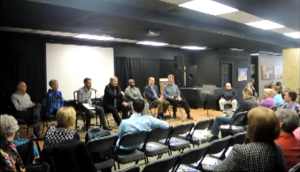
On Saturday March 15 I moderated a panel discussion in Columbiana, Alabama, on Sacred Harp music. The event was part of a daylong program called “We’ll All Sing Hallelujah” celebrating the opening of Sacred Sounds of Alabama, a new traveling exhibition created by the Alabama Folklife Association. The panel featured an esteemed and varied group of Alabama and Mississippi Sacred Harp singers, teachers, and authors:
- David Ivey, director of Camp Fasola, president of the Sacred Harp Musical Heritage Association, 2013 NEA National Heritage Fellow, and member of the music committee that edited The Sacred Harp: 1991 Edition,
- Buell Cobb, author of The Sacred Harp: A Tradition and Its Music and the new Like Cords Around My Heart: A Sacred Harp Memoir and past-president of the Sacred Harp Publishing Company and the National Sacred Harp Convention,
- Judy Caudle, editor of the annual Minutes and Directory of Sacred Harp Singings, member of the Sacred Harp Musical Heritage Association board of directors, and instructor at Camp Fasola,
- Warren Steel, author of The Makers of the Sacred Harp, professor of music and southern culture at the University of Mississippi, and instructor at Camp Fasola,
- Bridgett Hill, adjunct professor of psychology at the University of Alabama at Birmingham and popular instructor at Camp Fasola, and
- Bill Hogan, chairman of the Baldwin County Sacred Harp Convention and active singer and teacher out of The Christian Harmony and the Cooper and 1991 editions of The Sacred Harp.
Steve Grauberger, folklife specialist at the Alabama Center for Traditional Culture, recorded the day’s events and posted them to YouTube. I’ve embedded his video of the panel discussion above.
I asked the singers on the panel about how they became involved in Sacred Harp singing, what Sacred Harp singing means to them and why they choose to participate, how the style has changed over the course of their involvement, and what they imagine the future holds for Sacred Harp. The panelists spoke openly and with great feeling about their involvement in Sacred Harp singing. I’m grateful to them for their participation.
Our discussion followed two excellent talks: Buell Cobb reading two excerpts from his new memoir, and Warren Steel discussing the relationship between oral and written in Sacred Harp and related music. After the panel we walked over to the old Shelby County Courthouse, now the home of the Shelby County Historical Society, where David Ivey led a Sacred Harp singing.
“We’ll All Sing Hallelujah: Sacred Sounds of Alabama” was sponsored by the National Endowment for the Arts, Alabama Council on the Arts, Alabama Humanities Foundation, and the “Support the Arts” car tag fund. Thanks to Alabama Folklife Association executive director Mary Allison Haynie for her work organizing the event, and to Nathan Rees, who chaired the day’s talks and introduced the participants in our panel.